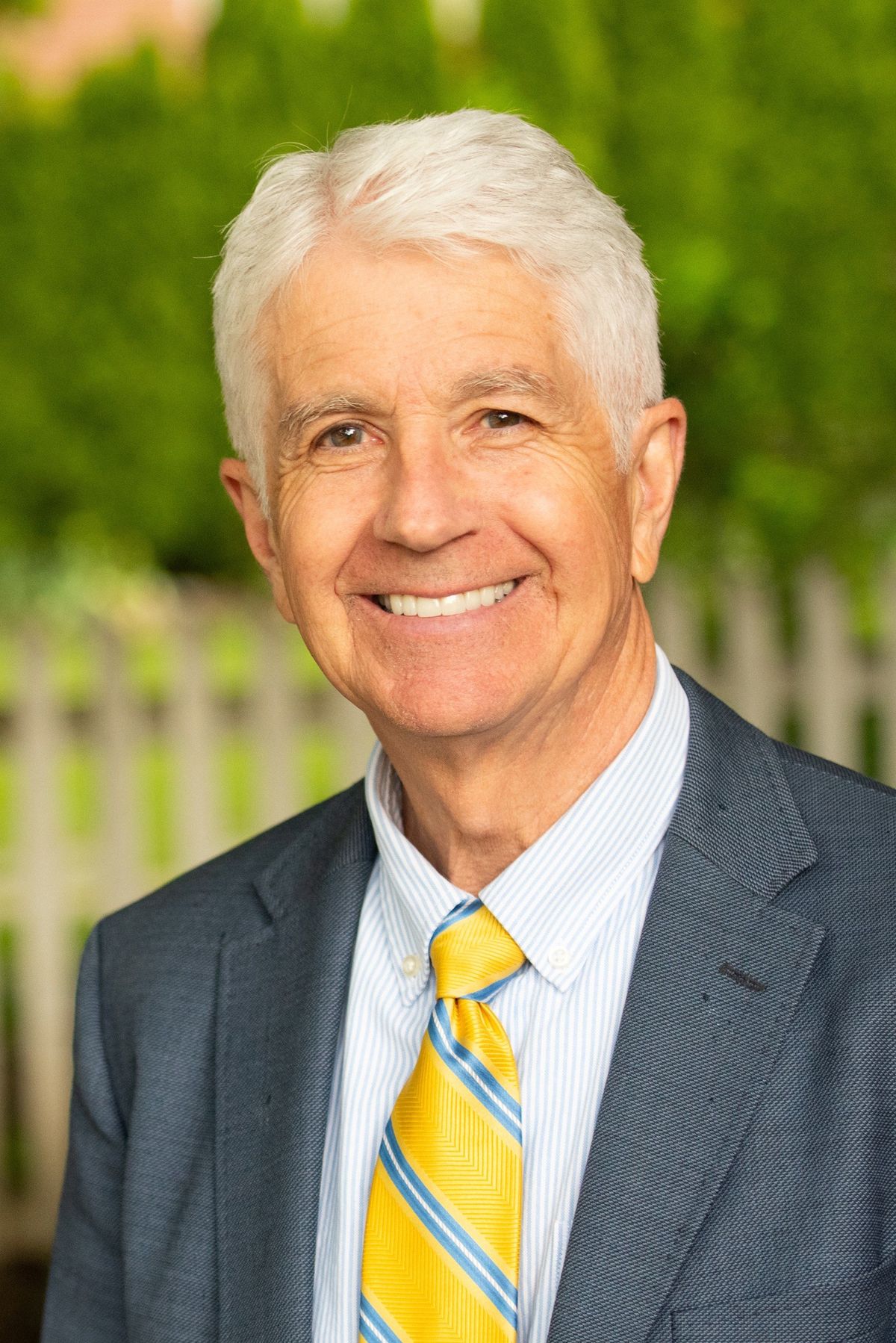Spokane Superior Court judges split along gender lines on endorsing incumbent Fennessy over court commissioner Scharosch
Candidates in the Aug. 6, 2023, primary election for Spokane County Superior Court Judge Position 11 (left to right) Court Commissioner Jerry Scharosh, F. Dayle Andersen, Judge Timothy Fennessy and Andrew Van Winkle.
None of the seven women serving as Spokane County Superior Court judges is backing their colleague Timothy Fennessy’s re-election campaign.
The split on the bench follows a pattern from the Spokane County Prosecutor’s Office filing motions so that they do not have to prosecute sex crime cases in Fennessy’s court.
Fennessy faces three challengers for his seat, who say his poor demeanor on the bench is part of the reason why they’d be a better fit for the job.
F. Dayle Andersen, a longtime local attorney, said Fennessy’s temperament is the reason why he’s running.
Andrew Van Winkle, an attorney at the Washington State Court of Appeals, said he hopes to modernize the court’s technology.
Jerry Scharosch, a Superior Court commissioner, touts his legal experience and calm demeanor.
Fennessy said he has not heard widespread complaints about his tone and that his experience on the court is important after a host of new judges have joined the bench in recent years.
While judges are elected every four years, most commonly they are appointed first by the governor after a sitting judge retires then run unopposed during the next election cycle. Fennessy was the most recent person to join the bench via an election when he challenged then-judge Greg Sypolt and won in 2016.
Court division
After drawing challengers, Fennessy announced in April to the other Superior Court judges that he planned to retire, according to minutes of a weekly judicial meeting.
He was then approached by several of the judges who asked him to reconsider his decision and run for another term.
One of those judges was Tony Hazel, who hoped to keep Fennessy on the bench because of experience.
“This is the kind of job that builds on itself,” Hazel said. “I personally believe it benefits our bench and the community to have a judge that has that judicial experience.”
The court is full of new appointees, with more than half of the judges having been appointed in the past five years. Judges Dean Chuang, Breean Beggs, Jeremy Schmidt, Marla Polin and Jacquelyn High-Edwards were appointed since 2022.
While the judges were under the impression that Fennessy was retiring, Scharosch (pronounced “Sharsh”) asked the other court commissioners if they planned to run for the open seat. When none came forward, he began asking judges if they would support him. Court commissioners are hired by the court to perform some judicial duties but don’t have the full authority of an elected judge.
Annette Plese, the most senior judge on the bench, said she was thrilled when Scharosch came and ask for her support.
“I love Jerry. I think he’s a great commissioner and a hard worker,” Plese said.
She, along with all of the other women judges and all of the court commissioners, endorsed Scharosch.
When Fennessy changed his mind, they continued to endorse Scharosch.
Among the men working as Superior Court judges, Chuang is co-endorsing Fennessy and Scharosch. Beggs, Schmidt, Hazel, and Ray Clary have endorsed Fennessy.
It’s rare for sitting judges to endorse a challenger to one of their colleagues, Plese acknowledged. She felt she couldn’t go back on her endorsement of Scharosch.
She also declined to offer a second endorsement.
“I think dual endorsing is telling people, ‘I can’t even decide, and I’m a judge,’ ” Plese said.
When asked about the gender split in endorsements, the women declined to address the issue.
Instead, they pointed to Scharosch’s demeanor and experience. Judge Rachelle Anderson pointed to his work ethic, demeanor, candor and morals as reasons he’d be a good fit for the bench.
“He is very kind, he is very thoughtful, very smart and very well-respected,” Polin said of Scharosch.
Scharosch said he did not intend to run against a sitting judge, but after Fennessy’s retirement announcement, he decided he wanted to run. When Fennessy changed his mind, Scharosch said he had already put too much money and time into the race to drop out.
The endorsements from sitting judges have been encouraging, he said.
“Even though Tim Fennessy’s flip-flopping has injected this division within the court, it’s very meaningful to me because it gives me the assurance that I’m making the right decision to stay in the campaign,” he said.
As for the gender split in endorsements, Scharosch said “people can draw their own conclusions.”
Fennessy said he is not concerned with the gender split of endorsements and understands why judges would not want to go back on their pledge to Scharosch. Retired Superior Court Judges Mary Ann Moreno and Linda G. Tompkins are endorsing Fennessy, along with state Supreme Court Judge Debra Stephens.
Demeanor and disqualifications
The most blatant critic of Fennessy’s demeanor among the candidates is Andersen, who said he’s “rude to anyone.”
“He just doesn’t have the appropriate judicial demeanor for someone that I would expect in his position,” Andersen said. “You expect a judge to listen to your arguments and at least consider them before outright rejecting them.”
Andersen said he is “kind of a one-issue candidate,” and that issue is Fennessey’s tone.
He said Fennessey appears to hold a grudge against attorneys for things that happen in court.
“I felt ire, shortness and ire, when I’ve been in front of him,” Andersen said. “I had a feeling that he had some personal animosity toward myself when I was presenting on a couple of motion hearings in front of him.”
While Andersen said he couldn’t give specifics, he went on to say that Fennessy seems to be an “angry man.”
Fennessy said he didn’t know how to respond because he hasn’t heard critics of his demeanor personally.
“Sometimes a judge has to be firm,” he said. “I firmly believe that I manage the courtroom with the interest of the parties and the victims.”
Van Winkle acknowledges that he has not personally appeared in front of Fennessy but heard the same complaints about his demeanor from the legal community.
He points to Fennessy’s rate of case disqualification and evidence that attorneys don’t like having their cases heard by him.
Attorneys have filed motions to prevent Fennessy from hearing their cases, a process called disqualification, more than 450 times since 2019, according to data obtained from the Superior Court Administrator’s Office by Van Winkle.
That’s substantively more than other judges, with Hazel being disqualified 142 times and Judge Shelly Szambelan being disqualified 135 times during that same period.
Other judges have been disqualified few times. Plese, for example, has been disqualified 50 times. Judge Julie McKay has been 27 times.
“I think it’s pretty telling,” Van Winkle said. “That should be a red flag.”
That the issue hasn’t been resolved over the course of years, Van Winkle said, is “a failure of interpersonal relations.”
Fennessy said he does not track the rate of disqualifications and noted that his fellow judges have not said the number of disqualifications is affecting their workload.
“None of my bench mates has come to me and said, ‘You need to do things differently,’ ” he said.
“Disqualification is the right of a lawyer,” he added.
Fennessy said it’s hard to compare rates of disqualification with judges switching dockets over time and each judicial officer’s personal and legal prior experiences being factors in why an attorney might disqualify them.
While the disqualifications of Fennessy were filed by both defense attorneys and prosecutors, along with attorneys involved in civil litigation, the Special Assault Unit of the Spokane County Prosecutor’s Office has filed disqualifications on most, if not all of their cases, in front of Fennessy for years.
Spokane County Prosecutor Larry Haskell, along with Chief Criminal Deputy Preston McCollam and other prosecutors in that unit, did not respond to requests for comment on the issue. Haskell is endorsing Scharosch, while McCollam is endorsing Van Winkle.
Scharosch was working in the special assault unit when the disqualifications began.
“Our unit had experience with Tim Fennessy, and other prosecutors in other units had experience with him regarding his judicial demeanor, regarding some of his legal rulings. What I had heard from others in the office was his less-than-compassionate approach toward crime victims,” Scharosch said. “I had cases before him as a prosecutor, and I received pushback from him on legal issues that I felt that his position was unjustified by the current law.”
The disagreement, Scharosch said, was specifically over jury instructions in a child sexual abuse case, which are extremely difficult and traumatizing for the victim to retry, making it even more important to get right the first time.
The unit as a whole decided to disqualify Fennessy on cases of child sexual abuse, child physical assault and adult sex crimes, Scharosch said. The disqualifications continued after Scharosch left, he noted.
When it comes to conflict over legal issues, Fennessy said he listens to the parties, but at some point has to make a decision that likely one party will be upset with.
“The judge has to move on and make that decision, and if the judge is wrong, there’s a court of appeals for that purpose,” Fennessy said.
Fennessy confirmed the prosecutor’s office has been filing affidavits to prevent him from overseeing some cases but said he hasn’t been told why. He said he is open to discussions both about his demeanor and the disqualifications.
He said he brings attorneys into his chambers to compliment them on their work, at which point they could raise any issues they have. Fennessy also said there were more opportunities in the past to have those kinds of discussions with attorneys because more was done in chambers, but now the preference is to do things in open court, which can limit frank discussion.
Colin Charbonneau, head of the Spokane County Public Defender’s Officer, said attorneys in his office did have complaints about Fennessy’s tone when they would cover hearings on co-workers’ cases, largely due to severe staffing shortages.
“There were a few times in court where some of my attorneys felt that he wasn’t as courteous as they would have liked him to be,” Charbonneau said.
He discussed the issue with Fennessy, whom Charbonneau said was receptive.
“To his credit, he listened to all the concerns, and quite frankly the behavior changed,” Charbonneau said.
Charbonneau is not endorsing anyone in judicial races.
Experience vs. innovation
After eight years on the bench and one as presiding judge, Fennessy said his experience makes him the best choice this election cycle.
“I believe that my experience both as a trial lawyer and eight years on the bench is a valuable asset,” he said. “ It’s something that I’ve loved, and I believe I am good at, so that’s why I want to stay.”
It has been difficult to balance trial work and the administrative duties of being presiding judge, Fennessy acknowledged. Having a less senior judge step into that role would be even harder for them to manage, he added.
If elected, Van Winkle hopes to push for increased use of technology in the court. With a looming attorney shortage, especially in public interest law, he believes that making it easier for people representing themselves to submit evidence online is critical.
King County uses a system called ShareFile that allows people to upload exhibits and automatically serve them on other parties to the case. Van Winkle pointed to that use of technology as something he would support and look to see implemented if on the bench.
While judges don’t have direct control over how things are filed, Van Winkle said they need to be flexible and supportive of new technologies.
“Really, it takes leadership from the bench to make things happen,” Van Winkle said.
Fennessy said he supports using technology in the criminal justice system, but the cost can be prohibitive. The current systems used in court don’t talk to each other, and it’s often not the job of judges to sort that out.
“Technology is moving so fast,” he said. “For the government and the court system to keep up is going to be hugely expensive.”
Along with his push for technology, Van Winkle said if elected he would support expanding mental health court and treat people with mental illness with dignity from the bench. He brings a unique understanding of people dealing with mental illness to the bench as a child of someone with schizophrenia, Van Winkle said.
“We just need to stop disrespecting people because of something we can’t control,” he said.
Scharosch’s focus as a judicial officer is making the courtroom a place where people feel heard, he said.
“People really thirst for justice in their lives,” Scharosch said. “When they come into court, everybody deserves dignity and respect from the bench, and they deserve a judicial officer that listens to them and then also explains their decisions in a clear and understandable way.”
Andersen said he doesn’t want to propose changes to the bench because he doesn’t have judicial experience.
“I hope that whoever wins this race, whoever wins all the races, recognizes that the responsibility of being a judge is greater than just sitting on the bench and listening to people come in there and complain,” Andersen said. “It’s a matter of taking everyone that comes to you evenhanded and doing the best to dispense justice as you can.”




